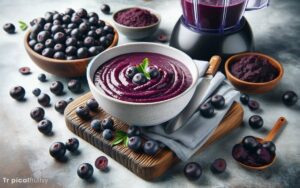Acai Berry Nutrition Facts 100g: A Complete Guide!
Acai berries offer a wealth of nutrients in each 100g serving, making them a powerful superfood. They have approximately 70 calories, most of which come from carbohydrates.
These berries are packed with antioxidants like anthocyanins, contributing to their deep purple color and health benefits.
They are also a source of vitamins such as Vitamin A, B1, B2, B3, and minerals including calcium, magnesium, and potassium.
The essential fatty acids in acai, like omega-3, omega-6, and omega-9, play a crucial role in maintaining heart and brain health. Additionally, the dietary fiber in acai aids in digestive health.
Acai berries are often celebrated for their nutrient density and potential health benefits:
Incorporate acai berries into your diet to enjoy a potent mix of nutrients that support overall health in just 100g.
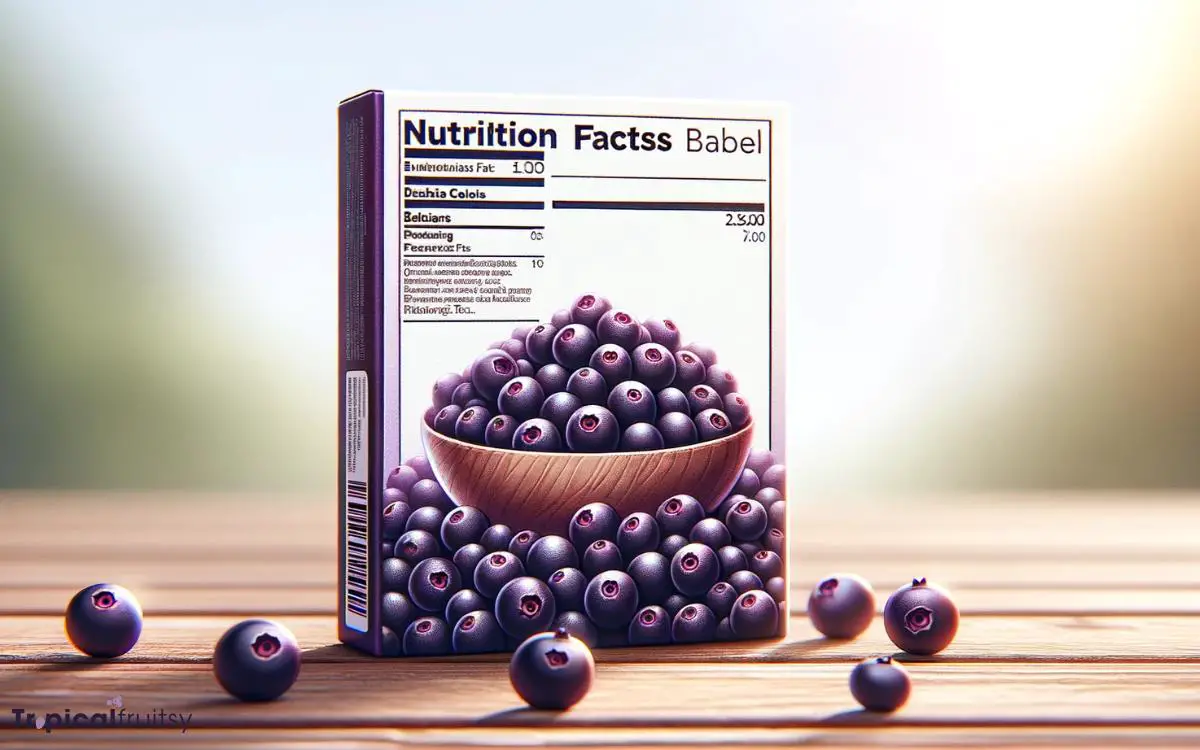
Key Takeaway
Acai Berry Nutrition Facts: A 100g Serving Breakdown
| Nutrient | Amount per 100g |
|---|---|
| Calories | 70 kcal |
| Carbohydrates | 4 g |
| Dietary Fiber | 2 g |
| Sugars | 2 g |
| Fat | 5 g |
| Saturated Fat | 1.5 g |
| Monounsaturated Fat | 1 g |
| Polyunsaturated Fat | 1.5 g |
| Omega-3 Fatty Acids | 0.1 g |
| Omega-6 Fatty Acids | 1.2 g |
| Omega-9 Fatty Acids | 1 g |
| Protein | 1 g |
| Vitamin A | 15 µg |
| Vitamin B1 (Thiamin) | 0.36 mg |
| Vitamin B2 (Riboflavin) | 0.01 mg |
| Vitamin B3 (Niacin) | 0.3 mg |
| Calcium | 9 mg |
| Magnesium | 29 mg |
| Potassium | 260 mg |
| Anthocyanins | Not specified |
| Flavonoids | Not specified |
Acai Berry Overview
The acai berry, a small, dark purple fruit native to the Amazon rainforest, has gained widespread popularity due to its purported health benefits and nutrient-rich profile.
Scientific analysis reveals that acai berries are a potent source of antioxidants, which are compounds that can neutralize the damaging effects of free radicals in the body.

Specifically, they are rich in anthocyanins, which contribute to their deep color and are known for their anti-inflammatory properties.
Acai berries also contain healthy fats, including omega-3, omega-6, and omega-9 fatty acids, which are essential for maintaining heart health and supporting cognitive functions.
Furthermore, they offer a range of vitamins and minerals, albeit in varying concentrations, providing a synergistic blend that is beneficial to overall wellness.
Caloric Content Breakdown
Understanding the caloric content of acai berries per 100g is essential for integrating this fruit into a balanced diet.
The macronutrient ratio, which includes carbohydrates, proteins, and fats, provides insight into how acai berries contribute to daily nutritional needs.

An analysis of these components will enable consumers and health professionals to evaluate the role of acai berries within a calorie-controlled eating plan.
Calories per 100g
Within 100 grams of acai berries, there are approximately 70 calories, primarily derived from carbohydrates and healthy fats.
This caloric content is modest when compared to many other fruits, positioning acai as a suitable option for those monitoring their calorie intake.
To further elucidate, consider the following breakdown:
- Carbohydrates account for the majority of calories, providing energy.
- Healthy fats are present, contributing to satiety and nutrient absorption.
- Essential amino acids are included, although in lesser quantities.
- Dietary fiber in acai berries aids digestion, but contributes minimally to total calories.
- The low sugar content makes acai an appealing choice for reduced-sugar diets.
Understanding the caloric composition of acai berries aids in integrating them into a balanced diet.
Next, let’s delve into the specifics of the macronutrient ratio to gain a deeper insight into their nutritional profile.
Macronutrient Ratio
Acai berry’s macronutrient profile demonstrates a harmonious balance of carbohydrates, fats, and proteins, essential for a well-rounded diet.
Upon analysis, acai berries contain approximately 6g of carbohydrates per 100g, primarily from dietary fibers and sugars.
Fats constitute about 5g per 100g, with a significant portion being heart-healthy unsaturated fats, including omega-3, omega-6, and omega-9 fatty acids. Proteins are present in lower quantities, roughly 2g per 100g.
This macronutrient ratio underscores acai berry’s potential as a nutrient-dense food with a caloric content that is predominantly derived from fats (about 45-50% of the total caloric content), followed by carbohydrates (40-45%), and proteins accounting for a smaller proportion of the caloric intake (5-10%).
Antioxidant Compounds
Antioxidant profile of acai berries, particularly in a 100g serving, is remarkable for its high concentration of polyphenols and flavonoids, which are known for their potent free radical-scavenging properties.

These compounds are instrumental in reducing oxidative stress in the body, which is linked to aging and many chronic diseases.
Here are key antioxidant compounds found in acai berries:
- Anthocyanins: Provide the deep purple pigment and are associated with heart health and cognitive function.
- Proanthocyanidins: Contribute to acai’s antioxidant capacity and may support vascular health.
- Vitamin E: An antioxidant that plays a role in immune function and skin health.
- Vitamin C: Helps in the regeneration of other antioxidants and is essential for collagen production.
- Ferulic acid: Aids in protecting against UV radiation and may promote skin health.
Each of these antioxidants contributes to the overall nutritional value of acai berries, enhancing their profile as a superfood.
Vitamin Composition
We should note that in a 100g serving of acai berries, the vitamin composition includes notable amounts of vitamins A, B1, B2, B3, and K, in addition to the antioxidants previously mentioned.
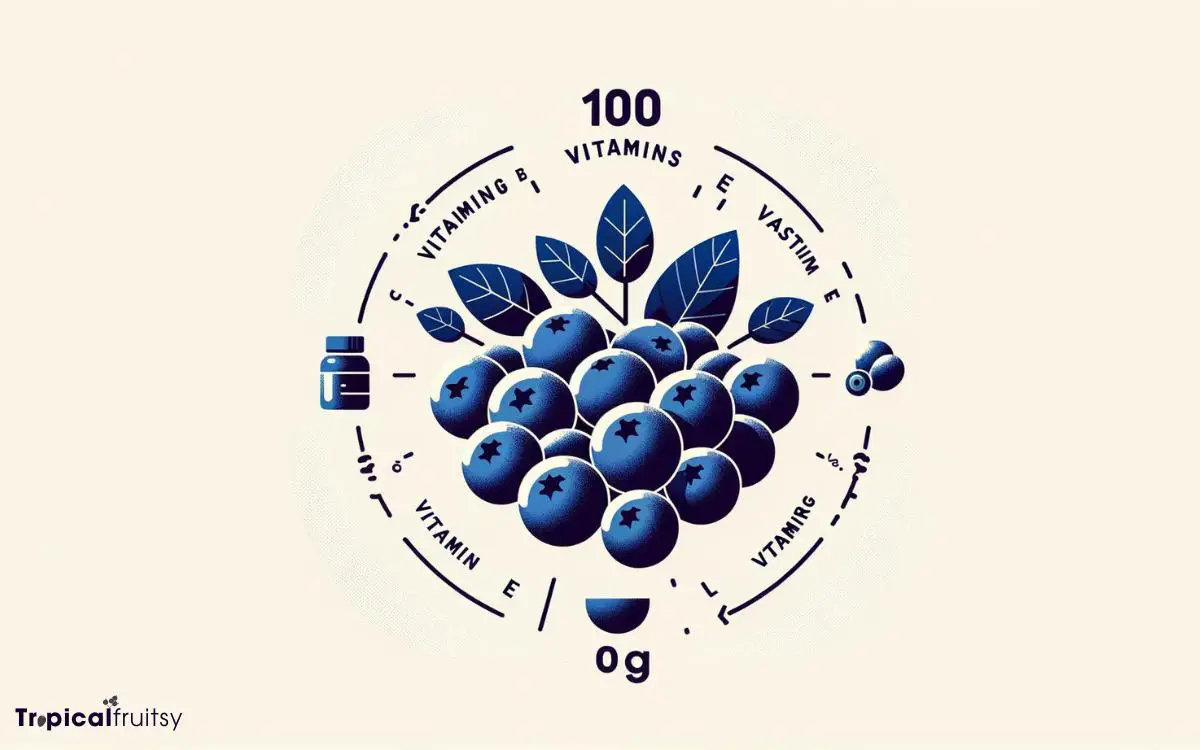
- Vitamin A is crucial for maintaining healthy vision, skin, and immune function.
- Thiamine (B1) is essential for energy metabolism and nerve function.
- Riboflavin (B2) aids in the breakdown of proteins, fats, and carbohydrates, while Niacin (B3) is important for digestive health and nerve function.
- Vitamin K is integral to blood clotting and bone health.
The precise quantities of these vitamins vary depending on factors like berry ripeness and processing methods.
Having discussed the vitamin profile, we now turn our attention to the mineral content analysis of acai berries to further understand their nutritional value.
Mineral Content Analysis
The mineral composition of 100g of acai berries contributes significantly to their overall nutritional profile, encompassing essential elements such as potassium, magnesium, calcium, and zinc.
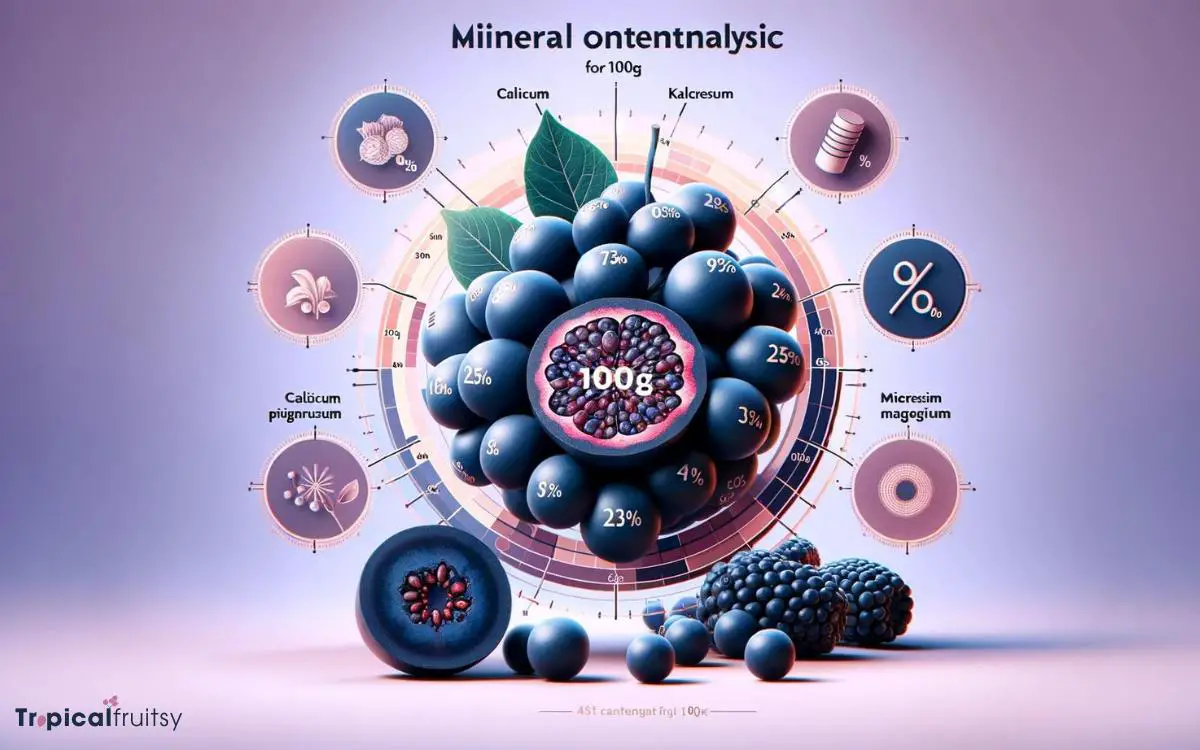
These minerals play vital roles in maintaining bodily functions, including nerve transmission, muscle contraction, and the structural integrity of bones and teeth.
- Potassium: Crucial for maintaining electrolyte balance and normal heart function.
- Magnesium: Involved in over 300 biochemical reactions in the body, supporting muscle and nerve function.
- Calcium: Fundamental for bone health and plays a role in blood clotting and muscle contraction.
- Zinc: Essential for immune system function, wound healing, and DNA synthesis.
- Phosphorus: Supports the formation of bones and teeth and is important for energy metabolism.
Understanding the mineral content in acai berries allows consumers to make informed dietary choices, appreciating the fruit’s contribution to their daily mineral intake.
Essential Fatty Acids
Transitioning from the mineral composition of acai berries, it is pertinent to examine their content of essential fatty acids.
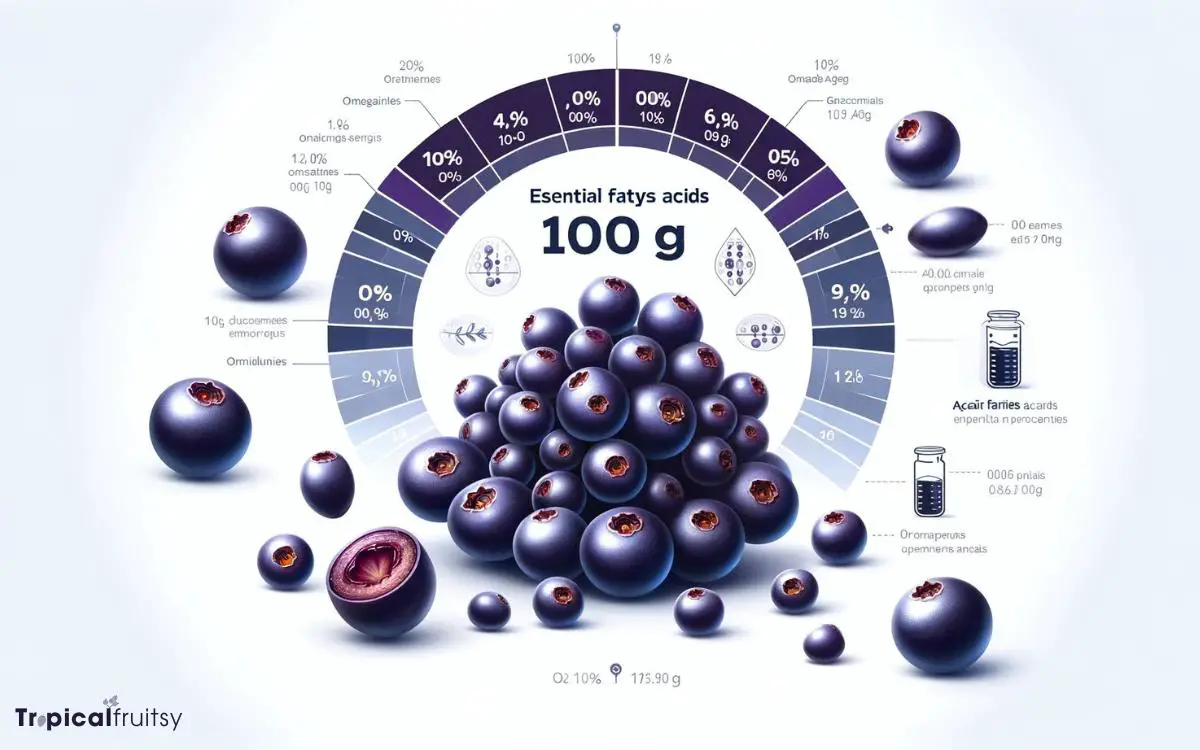
Acai berries contain notable levels of omega-3, omega-6, and omega-9 fats, which are crucial for maintaining cardiovascular health and modulating inflammation.
The analysis of these fatty acids will focus on their concentration within 100 grams of acai berries, their potential health benefits, and their role in anti-inflammatory processes.
Omega Fats Content
Acai berries are a rich source of essential omega fats, with 100 grams containing significant amounts of both omega-3 and omega-6 fatty acids.
These fats are pivotal to maintaining heart health, reducing inflammation, and supporting neurological function.
Detailed analysis of acai berries reveals a beneficial ratio of omega fats, which is critical since imbalances can lead to health problems.
- Omega-3 fatty acids: Anti-inflammatory properties, supports brain health.
- Omega-6 fatty acids: Pro-inflammatory in excess, but essential in moderation.
- Ratio of omega-6 to omega-3: Acai maintains a balanced ratio, unlike many Western diets.
- Polyunsaturated fats: These omega fats are a form of polyunsaturated fats, crucial for cell membrane integrity.
- Bioavailability: The fats in acai are readily absorbed due to their matrix in the berry.
Heart Health Benefits
Rich in essential fatty acids, 100 grams of acai berries provide cardiovascular benefits by promoting a healthy lipid profile and improving endothelial function.
These berries are particularly noted for their high content of oleic acid, a monounsaturated fat known to be heart-healthy.
Additionally, the presence of linoleic acid, a polyunsaturated fat, contributes to the regulation of cholesterol levels by facilitating the removal of harmful low-density lipoprotein (LDL) cholesterol from the bloodstream.
Scientific analysis reveals that the anti-inflammatory properties of these fatty acids can help reduce the risk of atherosclerosis, a precursor to cardiovascular disease.
Consuming acai berries may thus be a proactive measure in maintaining heart health, particularly when integrated into a balanced diet with other nutrient-dense foods.
Inflammation Reduction Properties
Regarding inflammation reduction, the essential fatty acids in 100 grams of acai berries, notably oleic and linoleic acids, possess anti-inflammatory effects that may alleviate chronic inflammation linked to a multitude of health issues.
- Oleic Acid: A monounsaturated fat known to suppress pro-inflammatory mediators, improving cellular health.
- Linoleic Acid: An omega-6 fatty acid that, when balanced with omega-3s, supports anti-inflammatory processes.
- Bioactive Compounds: Acai berries contain plant sterols that further contribute to anti-inflammatory actions.
- Synergistic Effects: The combined action of nutrients in acai may optimize inflammation control.
- Research: Scientific studies suggest that the intake of acai berry components can modulate inflammatory pathways, although more research is needed to fully understand their role and efficacy.
An evidence-based approach to nutrition highlights the potential for acai berries as part of an anti-inflammatory diet, underlining the importance of whole-food sources of essential fatty acids.
Dietary Fiber Benefits
Boasting a considerable amount of dietary fiber, 100 grams of acai berry contribute significantly to digestive health and regularity.
Dietary fiber is essential for maintaining a healthy gastrointestinal system, as it facilitates bowel movements and supports the formation of well-formed stools.

The consumption of dietary fiber is correlated with a reduced risk of chronic diseases such as type 2 diabetes, cardiovascular disease, and certain gastrointestinal disorders, according to clinical studies.
Fibers found in acai berries, like those in other fruits, can also act as prebiotics, stimulating the growth of beneficial gut bacteria, further enhancing gut health.
Including acai berries in one’s diet can thus be a strategic choice for those looking to improve their dietary fiber intake and promote overall digestive wellness.
How Do Acai Berries Compare to V8 Fusion Acai Mixed Berry in Terms of Nutrition?
When comparing acai berries to V8 Fusion Acai Mixed Berry nutrition, it’s important to note that the V8 Fusion drink contains added sugars and preservatives, whereas fresh acai berries are a natural source of antioxidants, fiber, and healthy fats. Acai berries also have lower sugar content than V8 Fusion Acai Mixed Berry.
What is the Nutritional Value of Acai Berry Seeds?
Acai berry seeds are a rich source of fiber, healthy fats, and plant-based protein. They also contain essential nutrients like iron, calcium, and antioxidants. The best places for acai seeds are health food stores or online retailers that specialize in superfoods and natural supplements.
Health Impact Summary
A 100-gram serving of acai berries offers a myriad of health benefits, ranging from improved cardiovascular health to potential anti-aging properties.
These deep purple fruits have been scrutinized in nutritional studies, confirming their status as a superfood.

Here’s a concise summary of their health impacts:
- Enhances heart health by providing cardio-protective antioxidants and healthy fats.
- Supports weight management efforts, attributed to its fiber content and potential influence on metabolism.
- May improve cellular health due to high levels of anthocyanins, which combat oxidative stress.
- Contributes to a healthier immune system through its vitamin and mineral profile.
- Promotes skin health, with some studies suggesting anti-aging effects from its antioxidant properties.
Each of these points is backed by scientific research, underscoring the importance of acai berries in a balanced diet.
Conclusion
The acai berry emerges as a nutritional powerhouse, akin to a miniature, natural multivitamin. It delivers an array of antioxidants, essential fatty acids, dietary fiber, vitamins, and minerals.
The comprehensive nutrient profile supports various health benefits, from antioxidant defenses to cardiovascular health.
This dark purple fruit, therefore, represents not only a flavorful addition to the diet but also a significant contributor to nutritional well-being and preventive health strategies.





